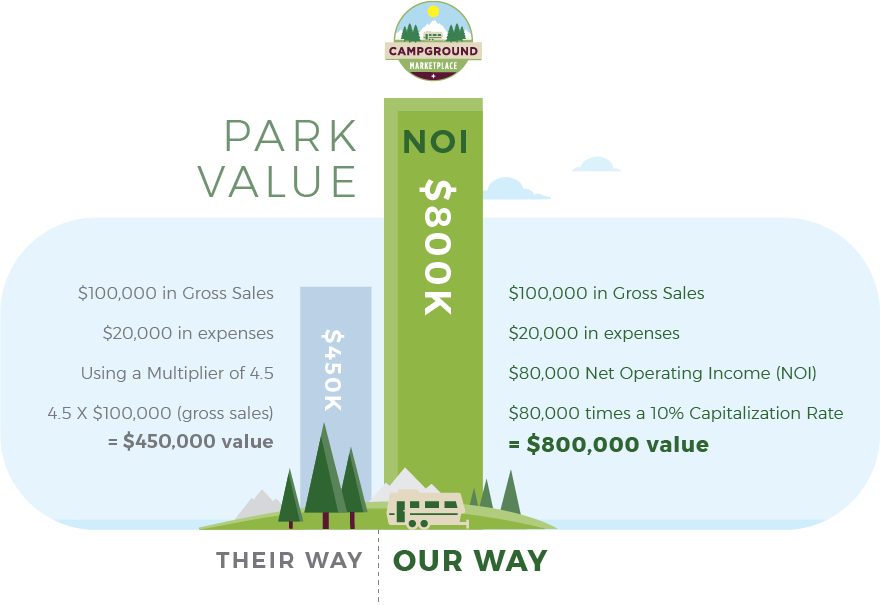Campground Valuation - What’s it worth?
How do I determine value when I want to sell my Campground, RV park or Resort?
Posted: February 10, 2023
Methods to Value a Business
There are many acceptable methods used to value a business, some are more suitable than others. The most suitable method will depend on the specific characteristics of the business being valued, such as its industry, size, and the circumstances of the sale.

Valuations Examples to come up with a value.
Some campground experts will give you a multiplier of 2.8, 3.8, 4.5 and 5 times gross sales to determine value.

We prefer using the Cash Flow Approach, Net Operating Income (NOI) as a method of valuation over traditional Gross Sales multipliers, as the Cash Flow Approach (NOI) provides a more accurate representation of worth.
NOI takes into account a campgrounds current financial performance (YOUR BOOKS) based on how you are running your park, while Gross multipliers are based solely on historical sales. There aren't any 2 campgrounds alike and this is why gross multipliers aren't a fair representation of value.
EBITDA stands for Earnings before interest, taxes, depreciation and amortization. A company's earnings AFTER interest, taxes, depreciation, and amortization is their net income. EBITDA is usually seen as a measurement of a company's overall ability to generate cash, not taking into account how much of that cash will be spent on essential expenses.

Whatever method you choose to value your park, it is important to:
- Remove personal biases about the property's value and establish a fair and competitive price.
- Carefully review and analyze business records and assets.
- Research the current market conditions.
To get started we collect financial documents for the past 36 months, such as:
- Income Tax Returns
- Profit and Loss statements
- Any personal expenses that were processed through the business
- Any one-time or non-regular expenses.
When evaluating the value of a campground, it is important to separate personal expenses from business expenses. This may include items such as health insurance, gas, groceries, vehicles, trips, and utilities, as they are often run through the campground but do not directly contribute to its financial performance. These expenses should be accounted for separately to accurately reflect the campground's bottom line.
Non-Recurring Expenses, also known as Seller's Discretionary Earnings, refer to items that are purchased or improved from a company's earnings that are not expected to occur again in the future. Examples include buying a new lawnmower, paving the roads, installing a new metal roof on a pavilion, or adding additional sites. These expenses should not be included in regular expenses as they are considered improvements.
Ways to increase gross sales by one-time investments that can generate long-term income, recurring income? Examples may include golf cart rentals, amusement park equipment such as slides and miniature golf courses, Glamping, tiny homes, cabins and high-end campsites with full amenities like upgrade your amp power, concrete pads, water, sewer, faster internet, cable, reservation system, social media and a nice website.

When Planning to Sell
When planning to sell, establish an exit strategy that includes setting a realistic and competitive selling price through a credible valuation. Gather all necessary financial tools, such as true income and expenses, net operating income, and personal expenses accounted with explanation.
Sell Your Campground, RV Park or Resort
We Have Marketing Options For You!
Call or email us! We are ready to help you achieve your dream.
(616) 957-2496 | info@thecampgroundmarketplace.com

